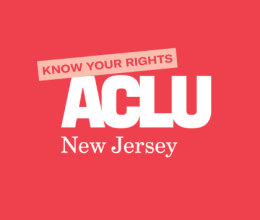
ACLU-NJ and eight civil rights groups contend that an overbroad ruling could imperil police accountability and transparency in the state
The ACLU of New Jersey, joined by eight civil rights groups, submitted arguments in a landmark case to define the limits of transparency when it comes to police accountability in New Jersey.
The Association of Black Women Lawyers of New Jersey, Black Lives Matter NJ, the Garden State Bar Association, Garden State Equality, Latino Action Network, LatinoJustice PRLDF, the Latino Leadership Alliance, and People’s Organization for Progress joined the ACLU-NJ in a friend of the court brief before the New Jersey Supreme Court in the case North Jersey Media Group v. Lyndhurst.
“It would not be an exaggeration to say that our state’s access to police records as a whole hangs in the balance,” said ACLU-NJ Transparency Law Fellow Iris Bromberg. “The lower court’s ruling is so broad that it would give law enforcement agencies in New Jersey license to deny almost any public records request dealing with police matters. The public has an enormous interest in understanding how law enforcement operates, from the local police department to the Office of the Attorney General.”
The case centers on requests the North Jersey Media Group (NJMG) made for records concerning a car chase that ended with a police officer fatally shooting the driver, Kashad Ashford. The Appellate Division in June 2015 drastically limited public access to law enforcement records when it reversed a lower court decision that had upheld the right of NJMG to access the requested police records under the Open Public Records Act (OPRA).
North Jersey Media Group, which owns The Record and Herald News newspapers, sought arrest reports, police logs, use of force reports and motor vehicle accident reports, among other records, shortly after the shooting of Ashford in September of 2014. Crucially, the request sought audio and video footage recorded during the incident. These recordings have become a powerful force for holding police accountable nationally, as evidenced throughout the brief with references to several high-profile police-involved deaths recorded on video. These incidents have sparked a national conversation regarding police abuse of power.
“This case is about so much more than access to records, in the same way that the videos of Rodney King, Eric Garner or Laquan McDonald are about so much more than just interactions captured on camera,” said ACLU-NJ Senior Staff Attorney Alexander Shalom. “The proliferation of video has irrevocably changed the landscape of policing for the better, but if police recordings have a blanket exemption from our records laws, much of that progress we see on the horizon will come to a sudden halt.”
“Police accountability, and the promise of video, has captured the national dialogue,” Shalom added. “What a shame it would be for New Jersey to head in the opposite direction of history.”
The defendants in the case — which include government representatives and law enforcement agencies in Lyndhurst, North Arlington, Rutherford and Bergen County, where the car chase happened, as well as the State Police — claimed the records sought were exempt from OPRA based on exemptions for criminal investigatory records and ongoing investigatory records.
The ACLU-NJ and its fellow amici argued that several important facts disqualify these records from the exemptions. First, the records sought here would be non-investigatory in nature, and they are required by law to be made, both of which invalidate any criminal investigatory exemption. Second, the ongoing investigatory exemption applies if the release of the records would be “inimical to the public interest,” which itself calls for a record-by-record analysis rather than the blanket rejection that was given. Further, the brief argues, given the current climate of policing it would be harmful to the public not to release the records, as it would sow even more distrust between community members and the officers sworn to protect them at a time when even law enforcement leaders lament the shortage of data within the profession.
“Our laws are clear: in our state, we err on the side of openness and transparency, and that principle doesn’t change when the information at issue involves law enforcement,” said ACLU-NJ Legal Director Ed Barocas. “The government is asking for powers of secrecy that the law does not grant. At a time when the law enforcement community readily acknowledges its shortcomings in collecting data, we should be tearing down the barriers that cast a shadow of secrecy over law enforcement, not erecting more.”
The amicus brief (PDF) and additional materials in the case, captioned North Jersey Media Group v. Township of Lyndhurst, can be read online. It will be argued before the New Jersey Supreme Court later this year.

